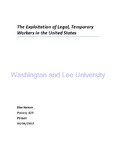The Exploitation of Legal, Temporary Workers in the United States

View/
Author
Hansen, Elise
Subject
Washington and Lee University, Shepherd Poverty Program
Temporary employment -- Law and legislation
Immigrants -- Government policy
Immigration Reform and Control Act of 1986 (United States)
Seasonal Farm Laborers Program
Agricultural laborers
Metadata
Show full item recordDescription
Elise Hansen is a member of the Class of 2013 of Washington and Lee University. Capstone; [FULL-TEXT FREELY AVAILABLE ONLINE] The population of legal temporary workers has fluctuated at different points in U.S. history, but their work conditions have remained almost universally abysmal. Historical patterns of employer behavior and political policy have allowed these conditions to exist today. “Agricultural exceptionalism,” the political practice of granting special labor rights exemptions to agricultural employers, has been a critical cause in the failure of the nation's two largest temporary worker policies to date, the Bracero Program and the Immigration Reform and Control Act. An examination of these two moments in temporary worker history sheds insight on the negative power of agricultural exceptionalism, the precedent that it has set for the current day, and the type of policies that the U.S. must avoid in the future. [From Introduction] Elise Hansen